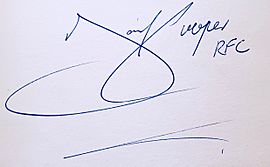Davie Cooper facts for kids
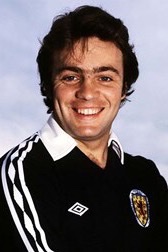 |
|||
| Personal information | |||
|---|---|---|---|
| Full name | David Cooper | ||
| Date of birth | 25 February 1956 | ||
| Place of birth | Hamilton, Scotland | ||
| Date of death | 23 March 1995 (aged 39) | ||
| Place of death | Glasgow, Scotland | ||
| Height | 5 ft 9 in (1.75 m) | ||
| Position(s) | Winger | ||
| Youth career | |||
| 1972–1974 | Hamilton Avondale | ||
| Senior career* | |||
| Years | Team | Apps | (Gls) |
| 1974–1977 | Clydebank | 90 | (28) |
| 1977–1989 | Rangers | 376 | (49) |
| 1989–1993 | Motherwell | 157 | (17) |
| 1993–1995 | Clydebank | 39 | (1) |
| Total | 662 | (95) | |
| International career | |||
| 1976–1977 | Scotland U21 | 6 | (1) |
| 1979–1990 | Scotland | 22 | (6) |
| *Club domestic league appearances and goals | |||
David Cooper (born 25 February 1956 – died 23 March 1995) was a Scottish professional football player. He was known as a fantastic winger.
Born in Hamilton, Scotland, Davie started playing football as a youth for Hamilton Avondale. He also worked as an apprentice printer. Many top clubs in Scotland and England noticed his amazing talent. But Cooper chose to sign for Scottish Second Division team Clydebank in 1974. This was the start of his professional football journey.
At Clydebank, Cooper showed huge potential. He was the club's top scorer in his second season. He also helped the club get promoted two years in a row, in 1975–76 and 1976–77.
In June 1977, at 21, Cooper joined Rangers for £100,000. For the next 12 years, he was a key player for Rangers. He played 540 games and won many trophies. These included the Scottish Premier Division in 1977–78, 1986–87, and 1988–89.
In August 1989, Cooper moved to Motherwell for £50,000. He played over 150 games for them. He was part of the team that won the 1991 Scottish Cup Final against Dundee United. Cooper also played for the Scotland national football team from 1979 to 1990. He played 22 times and scored 6 goals. He even played for Scotland in the 1986 FIFA World Cup in Mexico.
Later in his career, Cooper went back to Clydebank as a player and assistant coach. He planned to stop playing at the end of the 1995 season. However, on 22 March 1995, he suffered a serious brain injury while filming a TV show. He sadly passed away the next day at 39. Davie Cooper is remembered as one of Scotland's greatest football talents. He is also in the Scottish Football Hall of Fame.
Contents
Davie Cooper: Early Life and Football Dreams
Every time you saw him when he was a wee boy, he had a ball at his feet. Even then he was football daft. And after he moved away, if you saw him in the street he would always stop and ask you how you were.
Davie Cooper was born in Hamilton, Scotland, on 25 February 1956. His father, John, worked in a steel factory. His mother, Jean, was a barmaid. Davie and his older brother, John, were big Rangers fans. They often went to watch games at Ibrox.
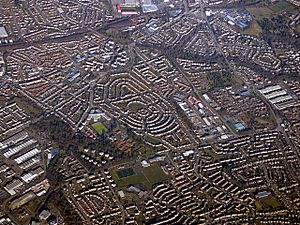
Davie went to Beckford Street Primary and then Udston Primary. He became captain of the Udston primary team. He played as an inside forward, which is like a deep striker today. His team won the Shinwell Cup youth tournament.
After primary school, Cooper went to St. John's Grammar School. He wasn't happy at first because the school didn't have a football team. So, friends of his parents started a new youth team called Udston United. Cooper was one of the first players. He even helped promote the new club in his local area.
Davie's older brother, John, went to England for a trial with Hull City. He found it tough and missed home. John came back to Scotland after two years.
Davie then joined Hamilton Avondale, a local youth team. He played for the under-16s and then the under-18s. He also got to play for Scotland's Amateur League team. At this time, he was working as an apprentice printer. Many big clubs wanted to sign Cooper, including Rangers, Motherwell, and English teams like Coventry City.
Davie Cooper's Club Career Highlights
Starting Strong at Clydebank (1974–1977)
When Davie Cooper turned 18, his printing apprenticeship ended. He wasn't playing much football outside of work. But then, a director from Clydebank, Jack Steedman, quickly signed him on 16 May 1974. Steedman later said it was the best thing he ever did in football.
Clydebank was an ambitious team back then. The club had tough training facilities, but it helped Cooper become a strong player. Defenders were allowed to tackle very hard in those days.
Cooper played his first game for Clydebank against Airdrieonians in the Scottish League Cup on 10 August 1974. His first full game was also against Airdrie. His first league game was on 31 August 1974 against Queen of the South.
Davie scored his first goal for Clydebank in a 4–1 win against Alloa Athletic. He ended his first season with 5 goals in 29 games.
In the 1975–76 season, Cooper played in every game. He was Clydebank's top scorer with 13 league goals. He even scored his first hat-trick against Alloa Athletic. Clydebank won promotion to the Scottish First Division that season. Cooper scored the opening goal in the promotion-winning match. He played 49 games that season, scoring 22 goals. Aston Villa offered £65,000 for him, but Cooper chose to stay with Clydebank.
The next season, 1976–77 Scottish First Division, Clydebank did very well. They battled with St Mirren, managed by a young Alex Ferguson. Clydebank had some amazing wins, like 6–0 against East Fife. Cooper helped the club go 17 matches without losing.
A big chance came when Clydebank played his boyhood club Rangers in the Scottish League Cup. Rangers were a top team. In the first game, Cooper scored a vital goal to make it 3–3. After several tough matches, Rangers finally won.
Rangers were very impressed with Cooper. They offered £100,000 to sign him. Cooper agreed to join the club he loved. His last goal for Clydebank was on 23 April 1977.
Rangers: A Dream Come True (1977–1989)
At 21, Cooper joined Rangers in summer 1977. He quickly became friends with new signings Bobby Russell and Gordon Smith. These three new attackers helped Rangers play exciting football.
Cooper played in his first Old Firm match against Celtic on 10 September 1977. Rangers won 3–2. He scored his first league goal for Rangers on 17 September 1977. His first goal at Ibrox was against his old club, Clydebank. He scored twice, including one directly from a corner kick.
His first trophy with Rangers was the 1978 Scottish League Cup Final on 18 March 1978. Rangers beat Celtic 2–1. Rangers also won the league title that season. They then won the 1978 Scottish Cup Final, completing a domestic treble. Cooper played in 52 of Rangers' 53 games that year, scoring 8 goals.
In 1979, Cooper scored a famous solo goal against Celtic in the Drybrough Cup Final. He "keepie upped" the ball over four Celtic players before scoring! This goal was voted the greatest ever Rangers goal by fans.
Cooper won many more trophies with Rangers. He won the League Cup in 1983–84, 1984–85, 1986–87, and 1987–88. He scored the winning penalty against Celtic in the 1986–87 final. The next season, he scored a free-kick in the final against Aberdeen. Rangers won on penalties.
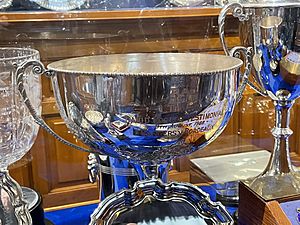
On 9 August 1988, Cooper had a special testimonial match against Girondins de Bordeaux. Over 43,000 fans came to watch. Cooper ended his Rangers career with 75 goals in 540 games. He said the highlight of his time at Rangers was simply "I played for the team I loved."
Motherwell: New Challenges (1989–1993)
After 12 years at Rangers, Cooper joined Motherwell in August 1989. He wanted to play more first-team football. His former teammate, Tommy McLean, was the manager there. Cooper's debut for Motherwell was on 15 August 1989. He helped them win 4–1. He scored his first goal for Motherwell in September 1989.
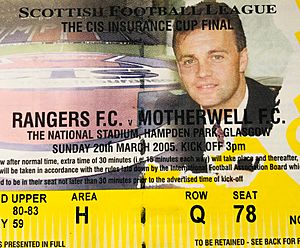
Cooper played for Motherwell for almost five years, playing over 150 games. His biggest achievement there was helping the club win the 1990–91 Scottish Cup. They beat Dundee United 4–3 in the final after extra time. The next day, Cooper and his teammates celebrated with thousands of fans in Motherwell.
Back to Clydebank (1993–1995)
While at Motherwell, Cooper also helped coach the younger teams. In December 1993, he returned to Clydebank as a player and assistant coach. He played 20 games in the 1993–94 season. He played regularly until February 1995.
Cooper scored his last goal in a Challenge Cup semi-final. His very last game was a reserve match on 21 February 1995.
Davie Cooper's International Career
Cooper first played for Scotland under-21s in 1976. His debut for the main Scotland team was on 12 September 1979. It was a 1–1 draw against Peru.
He returned to the national team on 28 February 1984, scoring against Wales. He scored again later that year in a 6–1 win against Yugoslavia.
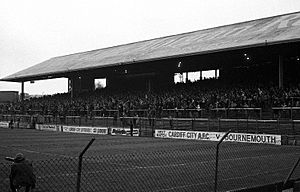
Cooper became a regular player for Scotland. Before the 1986 FIFA World Cup, he played in 11 games in a row. A very important match was against Wales in September 1985. Scotland needed a draw to keep their World Cup hopes alive. Cooper came on as a substitute. With only nine minutes left, Scotland got a penalty kick. Cooper scored it, and the game ended 1–1. This result helped Scotland qualify. However, the team's manager, Jock Stein, sadly passed away right after the game.
Cooper also scored in a play-off win against Australia. He played twice in the World Cup finals in Mexico. He scored his last two goals for Scotland on 12 November 1986. He earned his last of 22 caps on 16 May 1990. An injury stopped him from playing in the 1990 FIFA World Cup finals.
Davie Cooper's Unique Playing Style
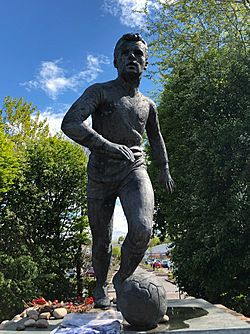
Many people believe Davie Cooper was one of the best players in Scottish football history. He was a winger who was very hard to play against. He had a creative and elegant style. He could easily get past opponents with his strength and amazing ball control. His former teammate, Mark Walters, said Cooper could "just glide past players."
Cooper was especially gifted with his left foot. He could deliver perfect crosses and set pieces. Former Scotland manager Andy Roxburgh said, "He could have played a violin with it." He meant Cooper's left foot was incredibly skilled. At Cooper's special testimonial dinner, his friend Ally McCoist joked about his left foot. He gave Cooper a mannequin right leg, saying it was "the one thing I never had."
Davie Cooper's Personal Life
Davie Cooper met Christine McMeekin in 1975. They got married in 1980 and had a daughter named Nicola. They were separated when Cooper passed away.
Cooper was a private person and didn't often talk to the press. This led to him being called "The Moody Blue." But his friends and teammates said he had a great personality and a ready smile.
Ally McCoist was a very close friend. He said he felt lucky to have shared football memories with Davie. McCoist and Derek Johnstone visited Cooper in the hospital before he died.
Davie Cooper's Sad Passing
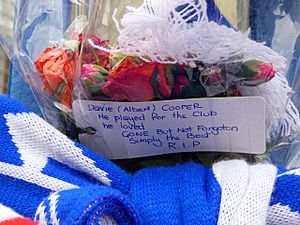
Before he retired, Cooper started coaching. He was presenting a TV show for young footballers called Shoot. On 22 March 1995, he suddenly collapsed while filming. This happened at a training pitch in Cumbernauld.
He was taken to the hospital. Doctors found he had a serious brain injury. His condition worsened, and he passed away the next morning, 23 March 1995, at 39 years old.
His funeral was held on 27 March 1995 in Hamilton. He was buried in Bent Cemetery.
Tributes to a Legend
News of Cooper's death made many people very sad. Fans of Clydebank, Rangers, and Motherwell left tributes at their stadiums. Jock Wallace Jr., who signed Cooper for Rangers, sent his condolences to Cooper's family.
It was revealed that Cooper had planned to open a football school for children. This would have been called the David Cooper Soccer School. A seven-a-side football tournament for schoolchildren, The Davie Cooper Soccer Sevens, was named in his honour. It still happens every year in his hometown of Hamilton.
Davie Cooper's Lasting Legacy
Davie Cooper is remembered as one of the most important players for Clydebank, Rangers, and Motherwell. He was inducted into the Rangers Hall of Fame in 2000. He also joined Clydebank's Hall of Fame in 2008 and Motherwell's in 2020.
Dutch football star Ruud Gullit once played against Cooper. He later called Cooper one of the greatest players he had ever seen. Gullit even included Cooper in his dream team for a football magazine.
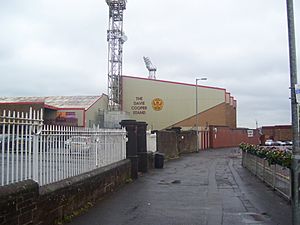
After Cooper's death, Motherwell renamed the North Stand at their stadium, Fir Park, in his honour. The 2005 Scottish League Cup Final between Rangers and Motherwell paid tribute to Cooper. Tickets had his picture, and some money from programme sales went to a centre for children with special needs.
In 1999, a statue of Davie Cooper was put up in his hometown of Hamilton. It's a bronze statue created by artist Kenny Mackay. In March 2020, 25 years after his death, his former teammates Ally McCoist and Mark Hateley laid a wreath at the statue.
Career statistics
International appearances
| National team | Year | Apps | Goals |
|---|---|---|---|
| Scotland | 1979 | 2 | 0 |
| 1984 | 5 | 2 | |
| 1985 | 6 | 2 | |
| 1986 | 5 | 2 | |
| 1987 | 2 | 0 | |
| 1989 | 1 | 0 | |
| 1990 | 1 | 0 | |
| Total | 22 | 6 | |
International goals
- Scores and results list Scotland's goal tally first.
| # | Date | Venue | Opponent | Score | Result | Competition |
|---|---|---|---|---|---|---|
| 1 | 28 February 1984 | Hampden Park, Glasgow, Scotland | 1–0 | 2–1 | British Home Championship | |
| 2 | 12 September 1984 | Hampden Park, Glasgow, Scotland | 1–0 | 6–1 | Friendly match | |
| 3 | 10 September 1985 | Ninian Park, Cardiff, Wales | 1–1 | 1–1 | 1986 FIFA World Cup qualifying | |
| 4 | 20 November 1985 | Hampden Park, Glasgow, Scotland | 1–0 | 2–0 | 1986 FIFA World Cup play-off | |
| 5 | 12 November 1986 | Hampden Park, Glasgow, Scotland | 1–0 | 3–0 | UEFA Euro 1988 qualifying | |
| 6 | 12 November 1986 | Hampden Park, Glasgow, Scotland | 2–0 | 3–0 | UEFA Euro 1988 qualifying |
Honours
- Clydebank
- Scottish Second Division: 1975–76
- Rangers
- Scottish Premier Division: 1977–78, 1986–87, 1988–89
- Scottish Cup: 1977–78, 1978–79, 1980–81
- Scottish League Cup: 1977–78, 1978–79, 1981–82, 1983–84, 1984–85, 1986–87, 1987–88
- Motherwell
- Scottish Cup: 1990–91
- Individual
- Scottish Football Hall of Fame
- Rangers Greatest Ever Team – 1999 Poll
Images for kids
 | Victor J. Glover |
 | Yvonne Cagle |
 | Jeanette Epps |
 | Bernard A. Harris Jr. |


